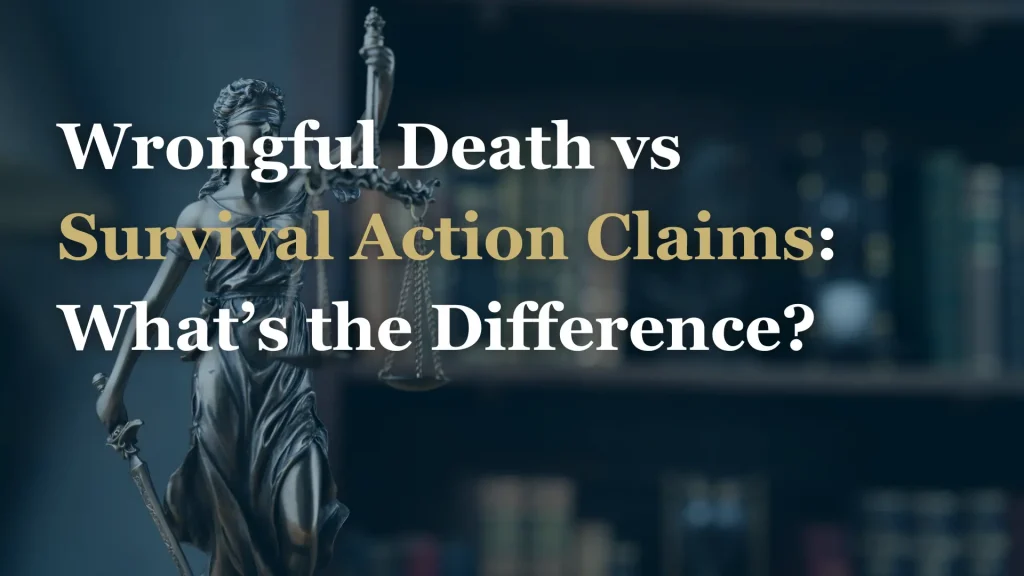
If your family member or loved one has died in an accident due to another’s negligence or wrongdoing, there are two potential legal paths to receiving financial compensation: a wrongful death claim or a survival action claim. Although similar, these two types of claims have different focuses and meet different ends. This article will cover the main things you need to know about a wrongful death vs. survival action claim and the differences between the two.
What Is a Wrongful Death?
A wrongful death is a death that was caused by the wrongful neglect, default, or act of another. A wrongful death claim can be brought by the personal representative of the deceased’s estate for the benefit of the surviving family members. Wrongful death claims serve to recover losses the deceased’s relatives and dependents suffered because of the death, such as loss of financial support.
For example, say the sole income earner of a home died in an accident. The deceased’s personal representative can bring a wrongful death action for the surviving spouse and children to secure compensation for losses they suffered.
Wrongful death claims can encompass a wide range of circumstances, including:
- Car accidents
- Work accidents
- Slip-and-fall accidents
- Malpractice
- Defective products
- Violent crimes
Note that South Dakota law explicitly defines the loss of an unborn child as grounds for initiating a wrongful death claim.
What Is Survival Action?
A survival action is a claim the deceased’s legal representatives bring to recover losses the deceased’s estate suffered because of their injuries.
For example, imagine someone sustained substantial injuries in a car accident due to another driver’s negligence. After six months of medical care, they pass away from their injuries. The deceased’s estate could file a survival action lawsuit against any responsible parties to cover any losses the deceased sustained during those six months. One way to think of a survival action claim is a personal injury claim that the deceased would have brought if they survived their injuries.
What’s the Main Difference Between a Wrongful Death Case and a Survival Action?
The core differences between wrongful death and survival action claims are when the losses were incurred and who benefits from the award. In both cases, the personal representative of the deceased’s estate files the lawsuit.
In a survival action claim, the plaintiff seeks compensation for the losses the deceased incurred before their death. This can include medical expenses, lost income, and pain and suffering. Any compensation is paid to the deceased’s estate, which distributes it according to their will.
In a wrongful death claim, the plaintiff seeks compensation for the losses suffered by the family because of the death of their loved one. Any compensation goes directly to the deceased’s spouse or children. If no spouse or children exist, then the deceased’s parents and next of kin will get the money.
Compensation for Wrongful Death and Survival Action
Survival action claims compensate the deceased’s estate for any losses the deceased suffered as a direct result of their accident, such as:
- Lost earnings
- Medical bills
- Pain and suffering
In contrast, compensation in wrongful death claims redress the losses of surviving family members. These losses can include:
- Loss of financial support
- Funeral expenses
- Emotional pain
- Loss of consortium
- Loss of support and guidance
Factors that can affect the compensation in a wrongful death claim include the deceased’s age, occupation, and potential for career advancement. A Watertown wrongful death attorney can calculate the losses of both the surviving family members and the deceased’s estate and fight for the maximum compensation in either case.
Who Can Make a Wrongful Death Claim and Survival Action Claim?
South Dakota Law states that only the personal representative of the deceased’s estate can make a wrongful death claim. The same is true for a survival action. In either case, if the deceased named an executor in their will, that person can initiate the claims. If there was no will or the deceased did not name an executor, the state can appoint a representative for the estate.
In some cases, eligibility for the two types of claims can overlap. If so, it is possible to simultaneously make a wrongful death claim and survival action claim and receive compensation for both.
It can often be beneficial to bring both types of claims. Specifically, a survival action claim can fill gaps in financial compensation from a wrongful death claim. For instance, the proceeds from a wrongful death claim may not cover outstanding medical bills the deceased’s estate still owes. In that case, a survival action claim can fill any gaps in compensation.
The legal processes for the two claims are different, so you’ll need to work with a personal injury attorney who can handle both claims for you.
What Is the Statute of Limitations for Wrongful Death and Survival Action Claims?

The statute of limitations for both wrongful death claims and survival action claims in South Dakota is three years from the death of the individual (SDCL 23-5-3).
Note that in South Dakota, the statute of limitations for suing the state is only one year from the date of the death (SDCL 21-32-2). Additionally, you must notify the state of your intent to sue within 180 days of the injury (SDCL 3-21-2).
Get Qualified Legal Help Today
Regardless of the circumstances of your case, the sooner you take action, the better. Getting started on your claim early gives your Watertown wrongful death attorney enough time to build a strong case and maximize your chances of receiving financial compensation.
Don’t worry if you think you can’t afford a lawyer. Turbak Law Office, P.C. works on a contingency fee basis. That means you pay nothing upfront and don’t pay us until we secure your compensation. Our fees will be an agreed-upon percentage of your compensation.
Send Turbak Law Office, P.C. a message today or call 605-886-8361 to discuss your wrongful death or survival action claims. We will treat you compassionately and provide your support at this difficult time.
Related Posts:
Who Can Sue for Wrongful Death in South Dakota
Don’t Let Your Loved One’s Life Become Undervalued After a Wrongful Death
The 4 Phases of Filing a Wrongful Death Lawsuit After Losing a Loved One
Why Pedestrian Deaths Are at a 28-Year High and What You Can Do If You Lost a Loved One
Wrongful Death Involving a Semi Accident? Here’s What You Need to Know